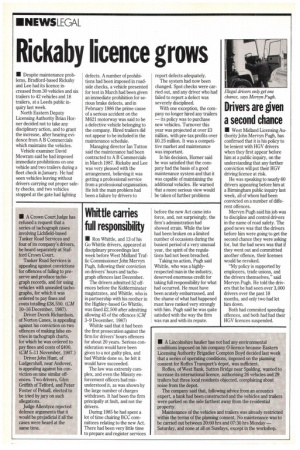Rickaby licence grows
Page 16

If you've noticed an error in this article please click here to report it so we can fix it.
• Despite maintenance problems, Bradford-based Rickaby and Lee had its licence increased from 30 vehicles and six trailers to 42 vehicles and 18 trailers, at a Leeds public inquiry last week.
North Eastern Deputy Licensing Authority Brian Horner decided not to take any disciplinary action, and to grant the increase, after hearing evidence from A B Commercials which maintains the vehicles.
Vehicle examiner David Mowram said he had imposed immediate prohibitions on one vehicle and two trailers during a fleet check in January. He had seen vehicles leaving without drivers can-ying out proper safety checks, and two vehicles stopped at the gate had lighting defects. A number of prohibitions had been imposed in roadside checks, a vehicle presented for test in March had been given an immediate prohibition for serious brake defects, and in February 1986 the prime cause of a serious accident on the M621 motorway was said to be a defective vehicle belonging to the company. Hired trailers did not appear to be included in the maintenance schedule.
Managing director Ian Tutton said the maintenance had been contracted to A B Commercials in March 1987. Rickaby and Lee was very pleased with the arrangement, believing it was getting a professional service from a professional organisation. He felt the main problem had been a failure by drivers to report defects adequately.
The system had now been changed. Spot checks were carried out, and any driver who had failed to report a defect was severely disciplined.
With one exception, the company no longer hired any trailers — its policy was to purchase new vehicles. Turnover this year was projected at over 23 million, with pre-tax profits over 20.25 million. It was a competitive market and maintenance was important.
In his decision, Horner said he was satisfied that the company had the basis of a good maintenance system and that it was capable of maintaining the additional vehicles. He warned that a more serious view would be taken of further problems
















































































































